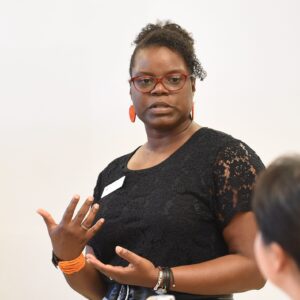By Sanjana Baldwa & William Chang, both grade 12
The Winged Post recently received the opportunity to conduct an exclusive interview with Stephen McCue, College Board educational manager for K-12 services, regarding the college exam company. McCue has been with the College Board for about four years. The work he does primarily serves schools and districts across California, Colorado and Wyoming, that are using College Board programs or who are thinking about using those programs.
Q: What exactly are you doing here at Harker?
A: Well, Derek [Kameda, upper school registrar,] contacted the office. I know he’s been involved with College Board for some time [as a member of the College Board’s Consultant Advisory Panel], and he just wanted to highlight some of the good things going on here [and] I brought a little bit [of internal data] to share with Derek […] to see if there’s anything we can do to really support what’s been happening here.
Q: As seniors, we’ve seen that a lot of colleges don’t consider the writing score. What does this indicate, in terms of importance to the colleges? Will it be phased out in the future?
A: I’m not speaking on behalf of our senior leadership, but for myself, I don’t anticipate that writing will be phased out at all. I think we, in 2005, made a real decisive action here to make sure that writing is featured prominently in the test, so that we would encourage the schools to focus more on writing as more of the curriculum. And that’s exactly what seems to have been happening to schools all across the country …. Actually when we introduced the section, we were a little concerned that it may not possibly be as much of a predictor of freshman year success as some of the other tried and true sections. Quite honestly, the opposite was true however – that the writing section was the most predictive of the three sections in terms of freshman year GPA in college. So, actually it’s a very useful part of the test for college admissions officers; some have just not yet changed their policies and embraced writing.
Q: How do you justify that the College Board tests have an accurate measurement of education or mental aptitude?
A: Well, we don’t really call them aptitude tests, but we do, through our standardized tests, have a clear objective, and that is to try to identify the specific college readiness skills that students need to know and do when they’re incoming freshmen. So what we’re trying to do throughout those assessments and [the College Readiness Pathway] is we try to introduce those skills that students should be responsible for, and when they’re struggling on a particular skill we try to identify opportunities for them to grow, to master those skills through practice material …. Our research shows that students who do prepare through the PSAT [and other early assessments] have a better average overall than those who don’t. [That’s] why when Derek mentioned that the policy was that all sophomores and juniors take the PSAT, I noticed that there were some who only took the PSAT as juniors. [For those] who took the PSAT as juniors only compared to those who took it as sophomores and juniors, there was about a 90 point difference on the SAT scores … that could certainly put you over a threshold at certain schools.
Q: For some of the tests you charge from $45 to $50; where does all the money go?
A: It goes … to the development of the program …. There’s quite a lot of research that goes into it, there’s quite a lot of overhead that’s involved, so there’s quite a lot of expense in just administering the SAT on a national basis, like it’s done several times a year. It’s my understanding that the SAT is not a real revenue generator for the company. It’s something that’s quite expensive to operate, and that’s why the cost is as it is. It’s a necessity. I think if we could lower that cost, we’ll be much inclined to do so. We’re a not-for-profit organization and … we try to take into account the struggling families that are out there that want to have access to these resources but have trouble dealing with them, and we try to be cognizant of the fact that we’re setting price for a year that we try to keep it as reasonable as we can.
Q: What would happen if there wasn’t a College Board and its standardized tests?
A: Well, we had that once actually, prior to the establishment of the College Board back in the late 1800s. The College Board was started in 1900, believe it or not; we’ve been around for a very long time. But back in the late 1800s, we had different entrance exams in for different colleges and it was that process which led to the establishment of the College Board, which was founded by leaders at various universities who decided that having students sit down and take [several entrance exams] was really not the best process or the best use of peoples’ time. They tried to come up with a streamlined or standardized test for those students to take to be utilized by more than one school, and that’s what led to the establishment of the College Board. So I think if we didn’t have this sort of standardized opportunity, it would be very difficult for students to have a true representation of themselves when applying to multiple schools, because each individual school would have its own standard that would have to be met. That’s a very expensive proposition, and also a very [time-consuming] proposition as well …. I think we recognized at the time that there was a need for such a service and I think we’ve tried to fill that need in every sense.
Read more on TalonWP: http://www.talonwp.com/2011/12/featured/issue-4-college-board-exclusive-interview/#ixzz1h8G9BjlC










